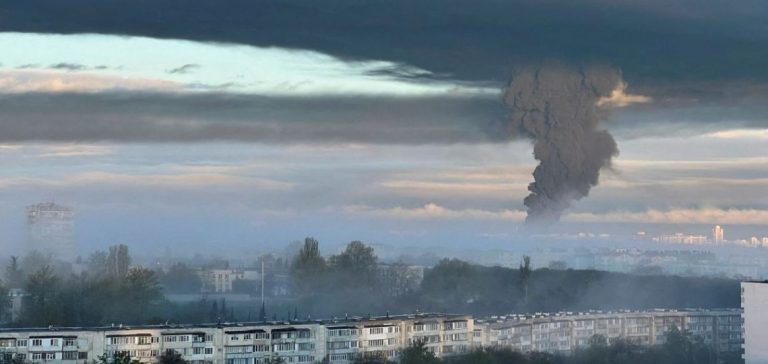The Ukrainian army announced that it had successfully carried out a strike against the largest oil terminal in Crimea, a peninsula annexed by Russia in 2014. This operation caused a major fire, according to Russian authorities, although they have not confirmed the origin of the attack.
Since the beginning of its invasion in February 2022, Ukraine has intensified its attacks on Russian energy infrastructures to weaken the logistics of Moscow’s forces. These actions specifically target strategic sites supporting Russia’s war effort on Ukrainian territory.
A strategic strike on Crimea
The Ukrainian army’s general staff stated that the strike was carried out using missiles, specifically targeting a maritime oil terminal located in Feodosiya. This site, designated as the largest in Crimea in terms of the volume of oil products handled, primarily served the Russian army in the region. The fire resulting from the attack was widely visible, with videos showing large columns of black smoke rising into the sky.
This operation marks a tactical shift for Ukraine, which had previously relied mainly on combat drones to carry out its attacks. The switch to using long-range missiles underscores a strategic adaptation in response to logistical challenges and delays in receiving Western armaments.
Russian reactions and local consequences
Russian occupation authorities in Crimea acknowledged a fire at an oil depot in Feodosiya but did not attribute the incident to a Ukrainian attack. They also stated that no casualties were reported as a result of the fire. Nevertheless, local disruptions are notable, with part of the city experiencing power outages and suburban train services being suspended.
These recurring attacks on Russian energy infrastructures have significant repercussions on the daily lives of residents in the region, increasing tensions and further complicating the humanitarian situation in Crimea and conflict zones in Ukraine.
An energy war context
Since the beginning of the invasion, Russia has carried out several campaigns targeting Ukraine’s energy network, leaving millions of people without electricity. These attacks have a devastating impact on civilian and military infrastructures, disrupting daily activities and weakening Ukraine’s ability to resist.
On the night from Sunday to Monday, a new attack was launched against Kyiv, the Ukrainian capital, using first explosive drones, followed by Kinjal ballistic missiles. Although the Ukrainian air defense shot down the projectiles, missile fragments fell in several districts, causing a quick fire but no casualties, according to the city authorities.
An intensification of military operations
Ukraine’s increased use of long-range missiles reflects a strategy aimed at maximizing the impact of strikes while bypassing limitations imposed by delays in Western arms deliveries. This tactical evolution could indicate a continuous adaptation of Ukrainian forces in response to the prolonged Russian offensive.
Ukrainian authorities have expressed frustration with delays in receiving missiles, which have so far limited the effectiveness of military operations. Despite these challenges, Ukraine persists in its efforts to weaken the Russian military position by targeting key infrastructures.
International and energy implications
These attacks on energy infrastructures have implications beyond the immediate conflict, affecting international energy markets and geopolitical relations. The destruction of oil terminals and fuel depots complicates energy supplies, exacerbating tensions already present in global markets.
International reactions to these strikes vary, with some countries supporting Ukraine’s actions as a measure of self-defense, while others call for peace talks to avoid further escalation of the conflict.






















